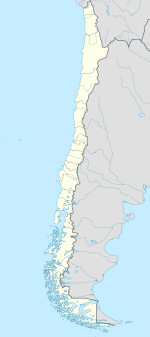This article needs additional citations for verification. (October 2020) |
Ovalle | |
|---|---|
 | |
| Coordinates: 30°36′S 71°12′W / 30.600°S 71.200°W | |
| Country | |
| Region | |
| Province | Limarí |
| Founded | 1831 |
| Government | |
| • Type | Municipality |
| • Alcalde | Jonathan Acuña Rojas |
| Area | |
• Total | 3,834.5 km2 (1,480.5 sq mi) |
| Elevation | 215 m (705 ft) |
| Population (2012 Census)[2] | |
• Total | 103,734 |
| • Density | 27/km2 (70/sq mi) |
| • Urban | 73,790 |
| • Rural | 24,299 |
| Sex | |
| • Men | 47,805 |
| • Women | 50,284 |
| Time zone | UTC−4 (CLT) |
| • Summer (DST) | UTC−3 (CLST) |
| Postal code | 1840000 |
| Area code | 56 + 53 |
| Climate | BSh |
| Website | Official website (in Spanish) |
 | |
Ovalle is a city in the Coquimbo Region of Chile,[3] founded in 1831 as a settlement. It has a population of more than 113,000 people. The name Ovalle was chosen to honor to Chile's vice-president, José Tomás Ovalle. Ovalle is the capital of the Limarí Province.
The city's setting is often likened to an oasis, being lush and green although surrounded by barren hills.[citation needed]
There is a trail leading from the city that lasts roughly 50 minutes, and features relatively safe bathing and an area where dinosaur fossils can be found. On the trail is a life-sized model of a brachiosaurus.
The town's football club is Deportes Ovalle. Famous players have played for the club, including 1982 FIFA World Cup player Rodolfo Dubó.
- ^ "Municipality of Ovalle" (in Spanish). Retrieved 28 July 2010.
- ^ a b c "National Statistics Institute" (in Spanish). Retrieved 4 November 2010.
- ^ "Tourism in Ovalle 2021: Summer in Ovalle".



